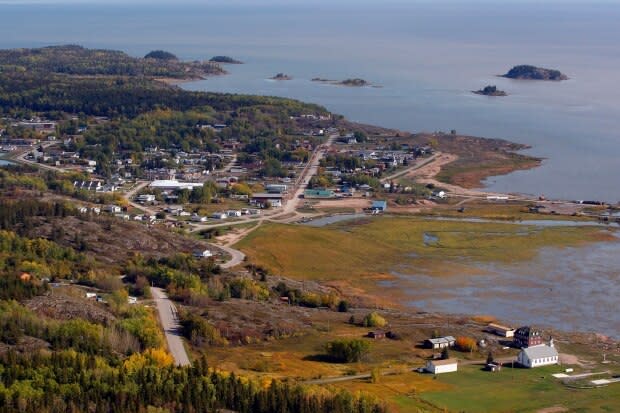Kenney in Ottawa to call for approval of massive open-pit oilsands mine
In Ottawa today to meet with the prime minister, Alberta Premier Jason Kenney said Justin Trudeau's government faces a stark choice: either approve Teck Resources' massive planned oilsands project or risk leaving the country's oil industry "with no way forward."
Teck's project, the Frontier Mine, is a 292-square-kilometre open-pit petroleum-mining operation in the northern reaches of Alberta. It's projected to produce some 260,000 barrels of oil a day — if it gets the necessary approvals from the federal Liberal government.
Kenney said the project, first proposed in 2011, would be a boon for Alberta's economy as the mine would create 7,000 jobs during construction and require up to 2,500 workers during operation.
The prospect of a new mine project is being welcomed by an industry being buffeted by low commodity prices and regulatory challenges.
"If this project does not proceed, it would be a clear indication that there is no way forward for this country's largest natural resource," Kenney said during a speech in Ottawa.
The mine is to be built roughly 120 kilometres north of Fort McMurray. Kenney said the project has secured the approval of Indigenous leaders in the area around the mine, including Chief Allan Adam of the Athabasca Chipewyan First Nation (a past opponent of oilsands development) and Metis Nation communities. Teck has signed support agreements with all 14 local Indigenous communities.

Kenney pressed Prime Minister Trudeau to issue the necessary approvals for the project in a meeting between the two leaders on Parliament Hill.
"This should be a simple federal ratification. This is a net plus for Canada," Kenney said of the Frontier mine after his meeting with Trudeau. "He said they'll be working toward a decision."
A spokesperson for Environment Minister Jonathan Wilkinson would not comment on the prospect of approval. The federal cabinet has until the end of February to decide on how to proceed.
Beyond the Frontier project, Kenney is asking Ottawa for major amendments to Bill C-69 — the environmental assessment overhaul — a new formula for the fiscal stabilization program, changes to flow-through shares to spur capital investment and federal recognition of provincial methane regulations.
On those requests, Kenney said he left his meeting with the prime minister feeling encouraged.
"I'm somebody who always tries to be hopeful. That's hard for a lot of Albertans who have been out of work for four years. But at least we have a federal government, a prime minister, that's willing to listen to our case and he indicated an openness," he said.
Even on Bill C-69, Kenney said the prime minister showed a willingness to engage with Alberta's demands.
"He's not going to move to repeal the bill but he did agree to work with us on its application on the regulations and on the project list," Kenney said.
Kenney has said his principal concern is with the legislation's "projects list," the criteria Ottawa uses to determine which proposed natural resources developments should go through a federal environmental review.
Under the legislation passed in the last Parliament, Kenney said, the Liberal government has created a "bureaucratic morass." He claimed even cleaner energy projects designed to lower greenhouse gas emissions — like transitioning power plants from coal to natural gas — are being held up by the new review.
Liberal Manitoba MP Jim Carr, Trudeau's special adviser on the Prairies, said the prime minister "reiterated the government's openness to talk about implementation," including the matter of which projects get picked for a review by Ottawa bureaucrats.
Federal regulators have approved Frontier
Frontier got the green light from regulators in July 2019 after a joint panel of officials from both the Alberta Energy Regulator and the Canadian Environmental Assessment Agency recommended the project receive the final necessary approval from the federal environment minister.
The panel concluded that, even if Frontier is built, Alberta would be able to keep emissions from the sector below the 100 megatonnes greenhouse gas emissions cap the former provincial NDP government imposed on the industry.
Alberta is currently "well below" the 100 megatonne limit, the panel said. Kenney has said he doesn't expect the province to exceed that cap because technical innovations have reduced the carbon intensity of oil production in recent years.
The panel projected the federal government would reap about $12 billion in taxes over the project's expected 41-year lifespan, while Alberta stands to gain more than $55 billion in taxes and royalties. Neighbouring municipalities will collect $3.5 billion in property taxes.
While saying the project should be built because it's in the public interest, the panel still flagged "significant adverse effects" on the environment and some neighbouring Indigenous communities.
"The project, in combination with other existing, approved, and planned projects, is likely to result in significant adverse cumulative environmental effects to wetlands, old-growth forests, wetland- and old growth-reliant species at risk, fisher, Canada lynx, woodland caribou, the Ronald Lake bison herd, and biodiversity," the joint panel report concluded.
"The panel also recognizes that if the project is approved and constructed, it may make it more difficult to achieve Canada's targets and commitments under the Paris Accord."
"It is simply unacceptable to even consider going ahead with the Teck Frontier project." - Green Party Parliamentary Leader Elizabeth May
As part of its Paris commitment, Canada has said it will lower emissions 30 per cent below 2005 levels by 2030.
Climate activists have steadfastly opposed the Frontier project.
Green Party parliamentary leader Elizabeth May called on the federal cabinet Tuesday to reject Kenney's call for approvals.
May took part in anti-Frontier protests outside the Canadian embassy Monday in Madrid, where climate negotiators have assembled to craft a follow-up agreement to the Paris accord.
"There is absolutely no wiggle room in the global carbon budget for any kind of expansion of oil and gas production," May said. "It is simply unacceptable to even consider going ahead with the Teck Frontier project."

